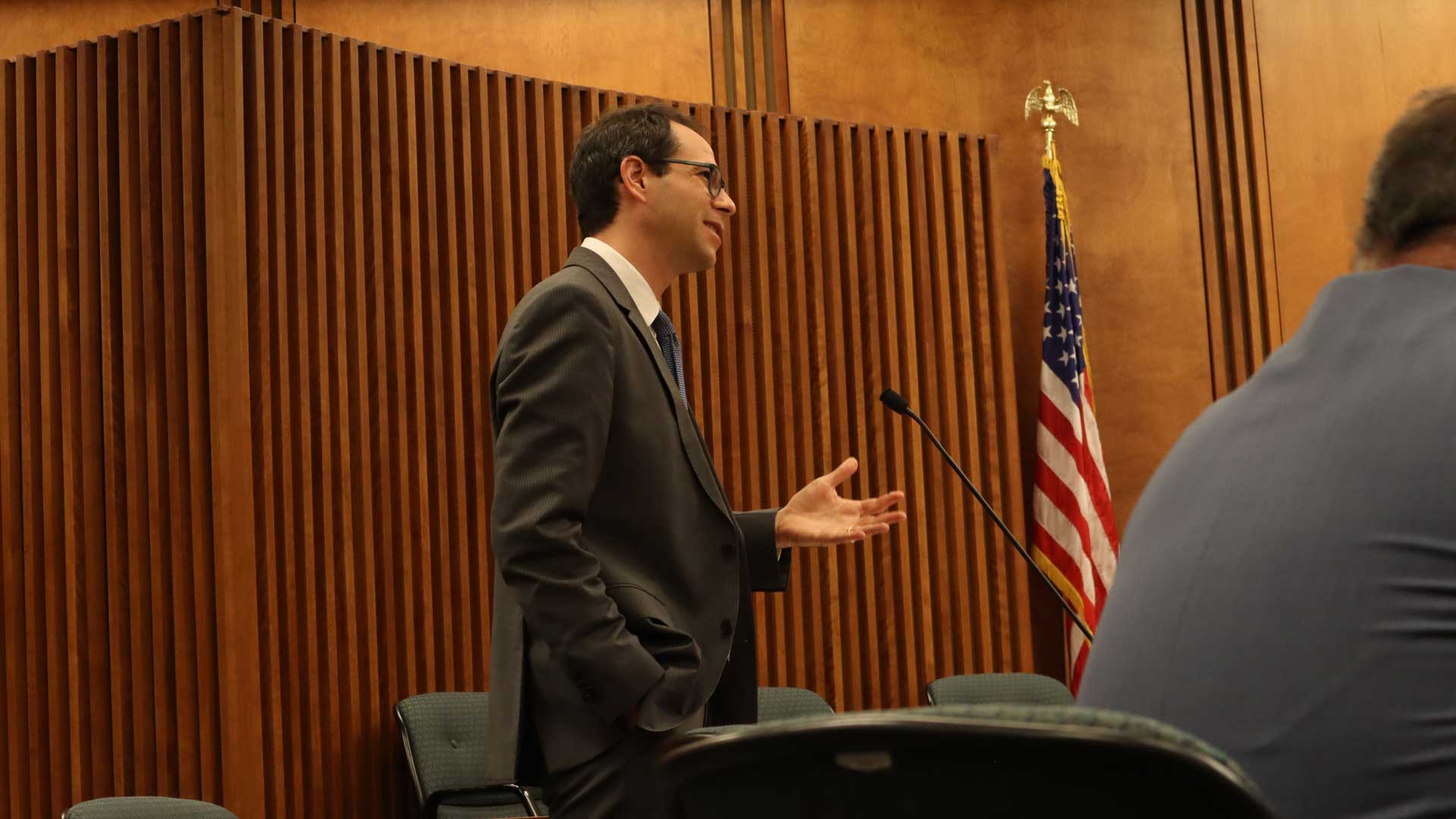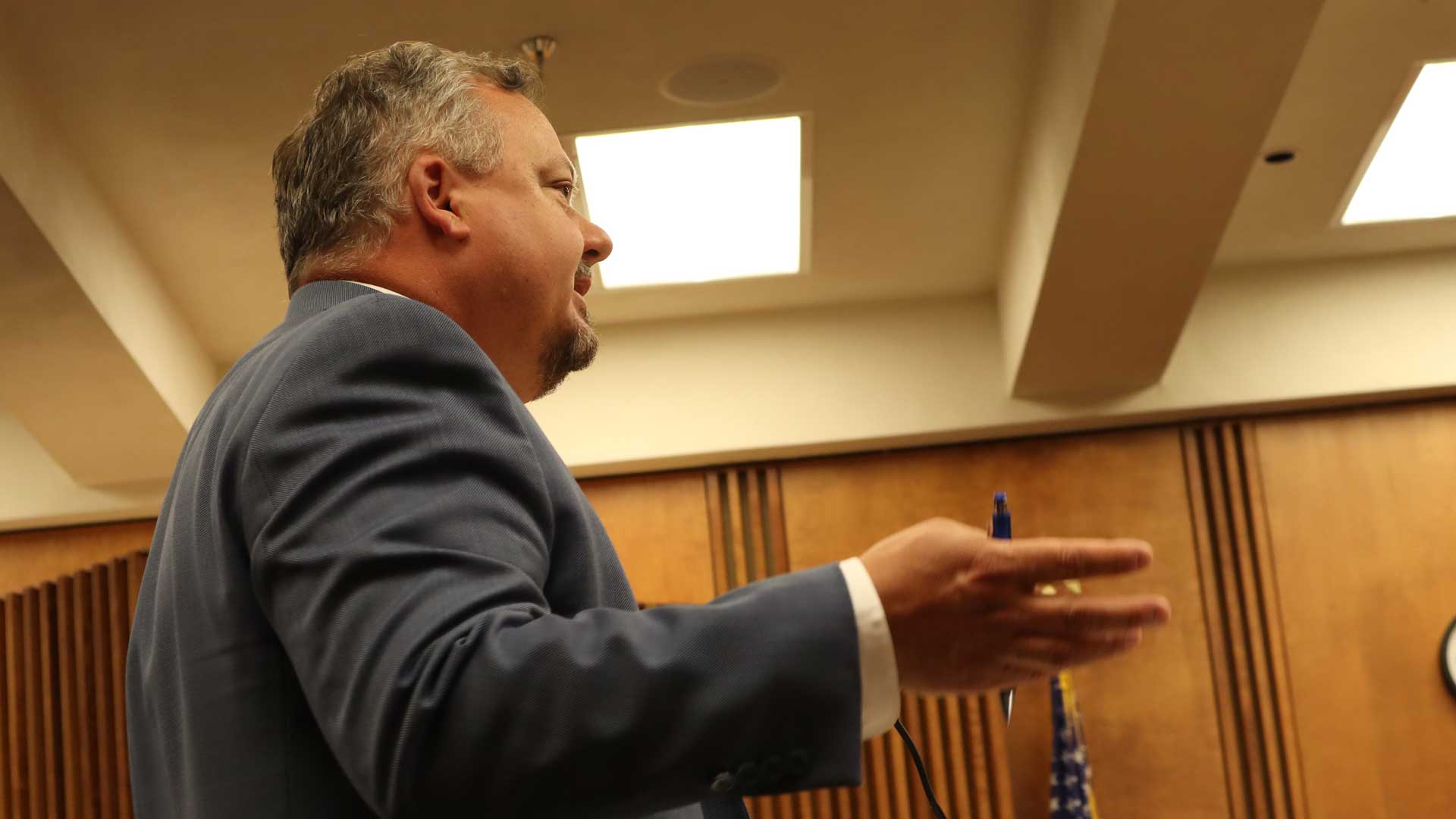 Arizona Solicitor General Joshua Bendor argued for a preliminary injunction on the Cochise County Board of Supervisors’ agreement with its County Recorder. The judge denied the request for the injunction on April 18, 2023.
Arizona Solicitor General Joshua Bendor argued for a preliminary injunction on the Cochise County Board of Supervisors’ agreement with its County Recorder. The judge denied the request for the injunction on April 18, 2023.
The Cochise County Board of Supervisors and the Arizona Attorney General met once again in court on Tuesday, where a Santa Cruz County Judge denied the Attorney General’s request for a preliminary injunction on the agreement the board approved with the Cochise County Recorder to act as interim elections director.
Judge Thomas Fink said that sections four, six, and nine of the agreement contain enough safeguards to ensure the board can maintain authority over the conduct of elections.
Section four of the agreement outlines that the recorder shall advise the board on election matters and present on any matter that requires board approval.
But a distinction is made in section six, where the agreement disclaims “Nothing in this agreement is intended to grant policy-making or budgetary approval authority to the Recorder for election matters within the statutory responsibility of the Board or the Clerk of the Board.”
Section nine defines the terms of termination of the agreement, which can be done by either the board or the recorder “without cause upon a ninety-day notice given by a majority vote of the Board at a public meeting or in writing by the Recorder to the Board.”
“The court’s moving papers contain factual allegations that this court would characterize as here we go again with Cochise County and elections,” said Judge Fink Tuesday afternoon. “These provisions are safeguards that are the court’s opinion sufficient to ensure that the board maintains authority over the conduct of elections in Cochise County.”
“For all these reasons, the court finds the state has failed to meet its burden,” Judge Fink continued. “The motion for preliminary injunction is denied.”
Arizona Attorney General Kris Mayes said in a statement on Wednesday that her office will continue to closely monitor elections in Cochise County.
“While we disagree with yesterday’s ruling, the defendants importantly conceded that the Cochise County Board of Supervisors does indeed retain supervisory authority over elections in Cochise County,” said Attorney General Mayes in an emailed statement. “Judge Fink apparently relied on this concession in his decision. Going forward, my office will closely monitor how elections are handled in Cochise County to ensure that the representations defendants made to the court are followed and that elections are managed lawfully.”
Arizona Solicitor General Joshua Bendor said in an email Wednesday afternoon that the state does not plan to appeal the ruling at this point.
The Argument
In court, Bendor argued that the board’s agreement illegally hands over the board’s statutory authority over elections to the county recorder.
“Under the agreement, the tallying or counting would be managed by the recorder with no oversight or control by the board,” Bendor said. “That again is contrary to statute."
“The agreement states that the board shall ‘canvass election results as prepared and provided by the Recorder,’” Bendor continued. “What if there are irregularities in how the recorder has prepared the canvass? The board has no recourse, again. It, therefore, has abdicated its responsibility to certify and declare the results of an election.”
But the board’s attorney Timothy La Sota argued that the agreement does have provisions to ensure the board’s oversight, and said that the agreement is similar to other contracting agreements between cities and counties for election services.
 Timothy La Sota, the attorney for the Cochise County Board of Supervisors, argued that the board’s agreement with its county recorder contains enough safeguards to maintain board oversight over elections.
Timothy La Sota, the attorney for the Cochise County Board of Supervisors, argued that the board’s agreement with its county recorder contains enough safeguards to maintain board oversight over elections.
“A good example is with the legislature when they put Governor Brewer’s tax on the ballot,” La Sota said. “They said specifically, if you’re a city that contracts with the county to run your election, then, you have to make sure this tax goes first on the ballot. So, I think that’s a very — an explicit recognition by the legislature that these types of agreements happen all the time.”
Noting Cochise County’s special election on May 16, La Sota argued that placing an injunction on the agreement would do more harm than good.
“Courts have, for a very long time, frowned on making changes in the middle of the election process,” said La Sota. “Even if you have something that might be objectionable, might be illegal, might be unconstitutional, there could be further damage from actually trying to intervene and provide relief … We’ve got an election that is happening and the harm that can be done is potentially more significant than what’s attempted to be enjoined.”
The agreement is allowed to stand for now. La Sota said that the board is expected to decide on a candidate for the elections director position next week.
Background
The April 5 filed motion by Arizona’s Attorney General claims that the board’s agreement with its county recorder “has no statutory basis and threatens the right of Cochise County residents to have their elections conducted lawfully and transparently.”
“The State has brought this action to prevent and redress those harms,” the motion read. “But the Court cannot un-ring the bell for the County’s voters once Defendants begin implementing the Agreement and exercising (or abdicating) authority thereunder in connection with the upcoming special election … the State respectfully asks the Court to preliminarily enjoin Defendants from implementing the Agreement.”
The legal action started on February 28[https://news.azpm.org/s/96238-cochise-county-recorder-to-head-elections/], when the Cochise County Board of Supervisors voted 2-1 to approve the agreement with Recorder Stevens. Republican Supervisors Tom Crosby and Peggy Judd voted in favor while Democratic Supervisor Ann English voted against it.
That triggered a lawsuit from Arizona Attorney General Mayes, which was filed on March 7, stating that the agreement the board made with Recorder Stevens “purports to give to the Cochise County Recorder almost all of the elections powers and duties conferred by statute upon the Cochise County Board of Supervisors.”
According to the filing, the Attorney General alleged that through the agreement, the county recorder unlawfully increased his power and the board also illegally handed over its statutory duties over elections to the recorder.
According to the agreement, the authority of appointing an elections director under the county recorder; the agreement also states that any appointment is subject to approval by the board.
Cochise County Administrator Richard Karwaczka said in a special meeting on Valentine’s Day that prior to the agreement’s drafting and approval, administrative and managerial functions of elections were delegated to the county administrator by the board of supervisors.
This agreement moves administrative authority over the elections department away from the county administrator, a nonpartisan county official who is appointed by the board of supervisors.
But this wasn’t the first time the board was sued by the state regarding elections.
2022 Election
In November, then Arizona Secretary of State Katie Hobbs sued the board for refusing to canvass the 2022 general election by the state’s November 28 deadline.
Supervisors Crosby and Judd, who make up the Republican majority on the board, stalemated the canvass under unsubstantiated claims from constituents that the ballot tabulation machines are rigged.
Then Elections Director Kori Lorick said in the meeting on November 18 that the voting machines have been tested and certified for accuracy.
“The equipment used in Cochise County is properly certified under both federal and state laws and requirements,” said Lorick. “The claims that the SLI testing labs were not properly accredited are false.”
Read the agreement between the Cochise County Board of Supervisors to name the County Recorder as interim Elections Director
 View or Download File
View or Download File

By submitting your comments, you hereby give AZPM the right to post your comments and potentially use them in any other form of media operated by this institution.